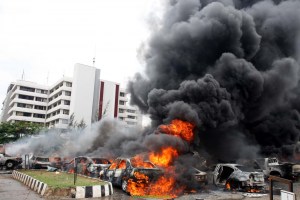 In ancient Rome, the river Rubicon marked the boundary between the Roman province of Cisalpine Gaul to the north-east and Italy proper. The river got its name from the Latin word rubico, derived from rubeus or red, because its waters are coloured red by mud deposits. Julius Caesar’s crossing of the river in 49 BC meant a virtual declaration of war against the republic, thus a point of no return. The word has found its way into popular use and today, crossing the Rubicon means reaching a point of no return.
In ancient Rome, the river Rubicon marked the boundary between the Roman province of Cisalpine Gaul to the north-east and Italy proper. The river got its name from the Latin word rubico, derived from rubeus or red, because its waters are coloured red by mud deposits. Julius Caesar’s crossing of the river in 49 BC meant a virtual declaration of war against the republic, thus a point of no return. The word has found its way into popular use and today, crossing the Rubicon means reaching a point of no return.
Last week, gunmen suspected to be Boko Haram sect members literally and figuratively crossed the Rubicon when they went on rampage in Gujba, Yobe state where they opened fire on students of the College of Agriculture as they slept in their hostels. They later moved to other houses where they killed residents at will. It didn’t matter that many of the slaughtered persons were women and children with nothing to do with the ongoing tripled-edged war of attrition between the military, Boko Haram and the civilian JTF.
Within the same period, other members of the sect reportedly blocked the Damaturu-Maiduguri road and randomly killed travelers, many of whom were Maiduguri residents who are forced to travel for hundreds of kilometres simply to make and receive phone calls because telephone communication in most parts of Borno state have been cut off. At the end of the attacks, nearly 100 persons had been killed, while many others remain missing, presumed dead.
Since the Boko Haram conflict began in 2009, there have been numerous atrocities attributed to the group. They have not shied away from killing anyone associated with government, no matter how remotely, and regardless of faith: Muslims and Christians have been killed with the same impunity. Churches, bars and other relaxation points were also a constant target, until as some observers note, the death of former National Security Adviser to the president, Gen Owoye Azazi. Was there a connection between Azazi the church bombings?
The insinuation is that Azazi masterminded the church bombings as well other attacks on bars and other relaxation places, particularly in the Middle Belt to further project Boko Haram’s jihadist credentials to inflame Christians in the North and consolidate Middle Belt support for President Goodluck Jonathan. Whatever the truths behind the allegations, it is a welcome relief that attacks on churches have stopped, though security at places of worship should not be relaxed just yet.
Responsibility for the massacre at Gubja, especially of students of the College of Agriculture, has to be placed squarely on the school authorities and state and federal security agencies, all of whom displayed serious lapses of judgment in not assigning any form of security to the school and its students. Even a basic armored personnel carrier and a number of soldiers at the school gate might have made a difference (although reports indicate that Boko Haram have actually managed to shoot down a number of military aircraft).
The declaration of a state of emergency in the states of Borno, Yobe and Adamawa does not seem to have made much difference. If anything, there appears to be more loss of lives and destruction of property, including the Baga and Bama attacks and counterattacks. What the escalation of violence shows is that Boko Haram has metamorphosed through the three phases of terrorism.
Initially, Boko Haram was a fringe religious sect. The transformation came when they embarked revenge attacks for the killing of their members attacks directed mostly at security personnel and educated elite. The failure of government to engage them in meaningful dialogue ensured their speedy movement the third phase – which is marked by indiscriminate killings and bombings. Being so staunchly against western education, one would expect them to better understand the nature of the religion they profess: Arbitrary killings have no place in Islam as a religion.
Yet, about three months ago, a Boko Haram commander in Kano ordered bomb attacks that killed 27 people and injured scores, simply to dispel reports that he was no longer in charge. What ideology supports such casual waste of life? Who were they avenging? Is this not terror, simply for the sake of terror?
The decimation of Boko Haram’s leadership means that in classic fashion, the group will splinter into small units of well-armed and well trained fighters. The danger is, now that they are killing everyone and everything in sight, any attempt at dialogue has been made doubly difficult. With no central control, who does government communicate with, and who can bring them to the negotiating table?
Poverty, illiteracy, unemployment, social inequality and injustice might have given birth to Boko Haram as an ideology; indecisive response to the extrajudicial killing of its leaders might have given it a militant hue, but with government’s high-handedness, poor judgment and refusal to face the real issues, Boko Haram has crossed the Rubicon, and as Tony Blair would say, now “fight without hesitation, kill without mercy and die without regret”.
